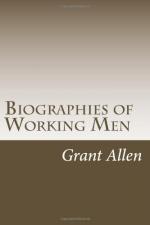About this time Herschel had been reading Ferguson’s “Astronomy,” and felt very desirous of seeing for himself the objects in the heavens, invisible to the naked eye, of which he there found descriptions. For this purpose he must of course have a telescope. But how to obtain one? that was the question. There was a small two-and-a-half foot instrument on hire at one of the shops at Bath; and the ambitious organist borrowed this poor little glass for a time, not merely to look through, but to use as a model for constructing one on his own account. Buying was impossible, of course, for telescopes cost much money: but making would not be difficult for a determined mind. He had always been of a mechanical turn, and he was now fired with a desire to build himself a telescope eighteen or twenty feet long. He sent to London for the lenses, which could not be bought at Bath; and Carolina amused herself by making a pasteboard tube to fit them in her leisure hours. It was long before he reached twenty feet, indeed: his first effort was a seven-foot, attained only “after many continuous determined trials.” The amateur pasteboard frame did not fully answer Herschel’s expectations, so he was obliged to go in grudgingly for the expense of a tin tube. The reflecting mirror which he ought to have had proved too dear for his still slender purse, and he thus had to forego it with much regret. But he found a man at Bath who had once been in the mirror-polishing line; and he bought from him for a bargain all his rubbish of patterns, tools, unfinished mirrors and so forth, with which he proceeded to experiment on the manufacture of a proper telescope. In the summer, when the season was over, and all the great people had left Bath, the house, as Carolina says ruefully, “was turned into a workshop.” William’s younger brother Alexander was busy putting up a big lathe in a bedroom, grinding glasses and turning eyepieces; while in the drawing-room itself, sacred to William’s aristocratic pupils, a carpenter, sad to relate, was engaged in making a tube and putting up stands for the future telescopes. Sad goings on, indeed, in the family of a respectable music-master and organist! Many a good solid shopkeeper in Bath must no doubt have shaken his grey head solemnly as he passed the door, and muttered to himself that that young German singer fellow was clearly going on the road to ruin with his foolish good-for-nothing star-gazing.
In 1774, when William Herschel was thirty six, he had at last constructed himself a seven-foot telescope, and began for the first time in his life to view the heavens in a systematic manner. From this he advanced to a ten-foot, and then to one of twenty, for he meant to see stars that no astronomer had ever yet dreamt of beholding. It was comparatively late in life to begin, but Herschel had laid a solid foundation already and he was enabled therefore to do an immense deal in the second half of those threescore




